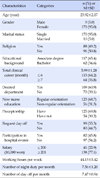Abstract
Purpose
This study was done to investigate new graduate nurses' perceptions of nursing professionalism, job involvement and turnover intention and to identify factors influencing turnover intention in new graduate nurses.
Methods
Participants were 179 new graduate nurses working in general hospitals and small and medium-sized hospitals in Gyungnam province. Data were collected from August 10 to September 16, 2015 through a survey with self-report questionnaires. Data were analyzed using descriptive statistics, t-test, ANOVA, Scheffé test, Pearson correlation coefficients, and multiple regression analysis.
Results
Mean scores were; for nursing professionalism, 3.62±0.73, for job commitment, 3.22±0.89. and for turnover intention, 3.25±0.95. There were significant correlations between nursing professionalism and job involvement (r=.47, p<.001), nursing professionalism and turnover intention (r=-.36, p<.001), job involvement and turnover intention (r=-.46, p<.001). For turnover intention of new graduates 25.1% of the variance was explained by nursing professionalism (β=-.16, p=.034), job involvement (β=-.36, p<.001), and frequency of night shifts (β=.03, p=.022).
Conclusion
Findings indicate that nursing professionalism and job involvement of new graduate nurses had significant influence on their turnover intention. Therefore, to reduce turnover intention of new graduate nurses, it is necessary to enhance their nursing professionalism and job involvement with organizational supports.
Figures and Tables
Table 2
Differences in Nursing Professionalism, Job Involvement and Turnover Intention of Difference according to Characteristics of Participants (N=179)

References
1. Baldwin JH. Coping with reality shock: The voices of experience. Nurse Educ. 1980; 5(5):6. DOI: 10.1097/00006223-198009000-00009.
2. Korean Hospital Nurses Association. Annual report 2013. Seoul: Korean Hospital Nurses Association;2014.
3. Han SS, Sohn IS, Kim NE. New nurse turnover intention and influencing factors. J Korean Acad Nurs. 2009; 39(6):878–887. DOI: 10.4040/jkan.2009.39.6.878.
4. Beecroft PC, Dorey F, Wenten M. Turnover intention in new graduate nurses: A multivariate analysis. J Adv Nurs. 2008; 62(1):41–52. DOI: 10.1111/j.1365-2648.2007.04570.x.
5. Yun HM, Kim JS. An analysis of the factors affecting turnover intention of new nurses. J Glob Health Nurs. 2012; 2(2):52–61.
6. McCloskey JC, McCain BE. Satisfaction, commitment and professionalism of newly employed nurses. Image J Nurs Sch. 1987; 19(1):20–24. DOI: 10.1111/j.1547-5069.1987.tb00581.x.
7. Han SS, Kim MH, Yun EK. Factors affecting nursing professionalism. J Korean Acad Soc Nurs Educ. 2008; 14(1):73–79. DOI: 10.5977/jkasne.2008.14.1.073.
8. Yeun EJ, Kwon YM, Ahn OH. Development of a nursing professional value scale. J Korean Acad Nurs. 2005; 35(6):1091–1100.
9. Hampton GM, Hampton DL. Relationship of professionalism, rewards, market orientation and job satisfaction among medical professionals. The case of Certified Nurse-Midwives. J Bus Res. 2004; 57(9):1042–1053. DOI: 10.1016/s0148-2963(02)00356-9.
10. Hallin K, Danielson E. Registered nurses' perceptions of their work and professional development. J Adv Nurs. 2008; 61(1):62–70. DOI: 10.1111/j.1365-2648.2007.04466.x.
11. Yoon HK, Choi JH, Lee EY, Lee HY, Park MJ. Effects of decision making competency, nursing professionalism, and job satisfaction on turnover impulse among nurses. J Korean Acad Nurs Adm. 2013; 19(5):658–667. DOI: 10.11111/jkana.2013.19.5.658.
12. Kim MR. Clinical nurses' professionalism, nursing performance and intention of retention [master's thesis]. Seoul: Hanyang University;2008.
13. Leddy S, Pepper JM. Conceptual bases of professional nursing. Philadelphia: Lippincott;1985.
14. Hwang SY, Lee EJ, Na DM, Lee GS, Sun GS, Lee CS. The clinical experiences of newly-qualified nurses. J Korean Acad Nurs Adm. 2002; 8(2):261–271.
15. Cho HH, Kim NH. Relationships among nursing professionalism, nurse image, and core elements of nursing professionalism that nursing students perceive. J Korean Acad Soc Nurs Educ. 2014; 20(4):548–557. DOI: 10.5977/jkasne.2014.20.4.548.
16. Kanungo RN. Work alienation and involvement: Problems and prospects. Appl Psychol. 1981; 30(1):1–15. DOI: 10.1111/j.1464-0597.1981.tb00976.x.
17. Kim JA. The relationship between the nurse's reward fit and job involvement, organizational commitment. J Korean Nurs Adm. 1997; 3(2):41–59.
18. Han YH, Sohn IS, Park KO, Kang JH. The relationships between professionalism, job involvement, organizational commitment and turnover intention among clinical nurses. J Korean Clin Nurs Res. 2010; 16(2):17–31.
19. Kim MS. Effects of hospital nurses' perceived organizational support on job involvement and organizational citizenship behavior. J Korean Acad Nurs Adm. 2013; 19(4):480–490. DOI: 10.11111/jkana.2013.19.4.480.
20. Seo YS, Kim YC. A study on factors affecting the turnover intention and job involvement of nurses. Korean Bus Educ Assoc;2007. p. 151–172.
21. Chen HC, Chu CI, Wang YH, Lin LC. Turnover factors revisited: A longitudinal study of taiwan-based staff nurses. Int j nurs stud. 2008; 45(2):277–285. DOI: 10.1016/j.ijnurstu.2006.08.010.
22. Han Y, Park Y. Effects of self-leadership and job involvement on clinical competence in general hospital nurses. J Korean Acad Nurs Adm. 2013; 19(4):462–469. DOI: 10.11111/jkana.2013.19.4.462.
23. Lawler EE. Satisfaction and behavior. In : Hackman JR, Lawler EE, Porter LW, editors. Perspectives on behavior in organizations. 2nd ed. New York: McGraw-Hill;1983. p. 78–97.
24. Park HS. Relationship between perceived nursing care role orientation, job characteristics, and turnover among nurses [master's thesis]. Seoul: Yonsei University;2002.
25. Faul F, Erdfelder E, Buchner A, Lang AG. Statistical power analyses using G*Power 3.1: Tests for correlation and regression analyses. Behav Res Methods. 2009; 41(4):1149–1160. DOI: 10.3758/brm.41.4.1149.
26. Ha MN. The effects of nursing practice environment on nursing professionalism for new nurses [master's thesis]. Busan: Dong-A University;2014.
27. Song MS. Influence of emotional labor on job involvement, job satisfaction, and turnover intention of clinical nurses. J Korea Acad Ind Coop Soc. 2014; 15(6):3741–3750. DOI: 10.5762/KAIS.2014.15.6.3741.
28. Yu HS. A study on self-esteem and turnover intention of new nurses [master's thesis]. Seoul: Ewha Womans University;2010.
29. Yang YS, Kang YH. ICU new nurses' job stress, job satisfaction, organizational commitment and turnover intention. Nurs Sci. 2013; 25(2):47–58.
30. Kim SH, Lee MA. Effects of emotional labor and communication competence on turnover intention in nurses. J Korean Acad Nurs Adm. 2014; 20(3):332–341. DOI: 10.11111/jkana.2014.20.3.332.




 PDF
PDF ePub
ePub Citation
Citation Print
Print





 XML Download
XML Download